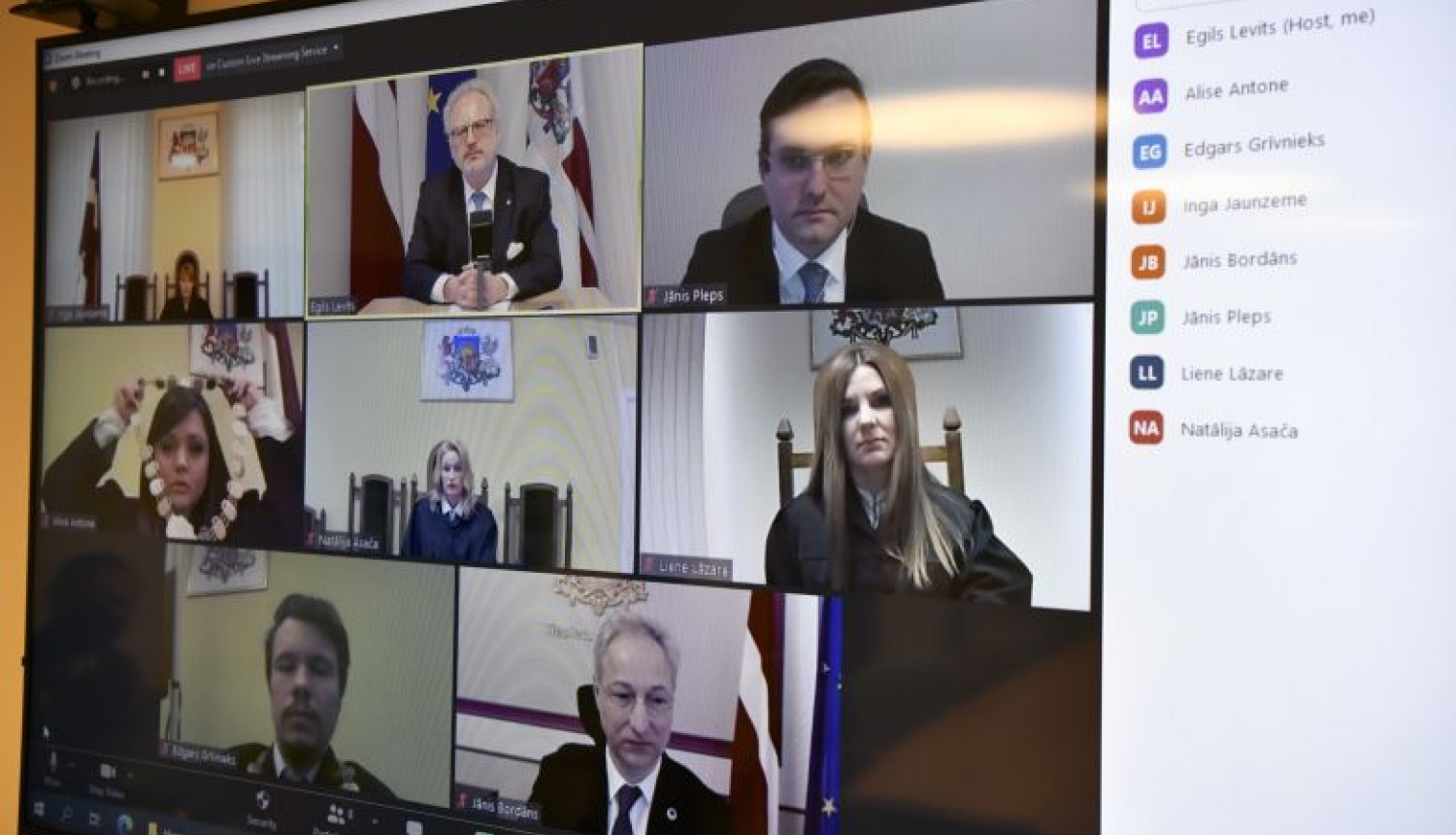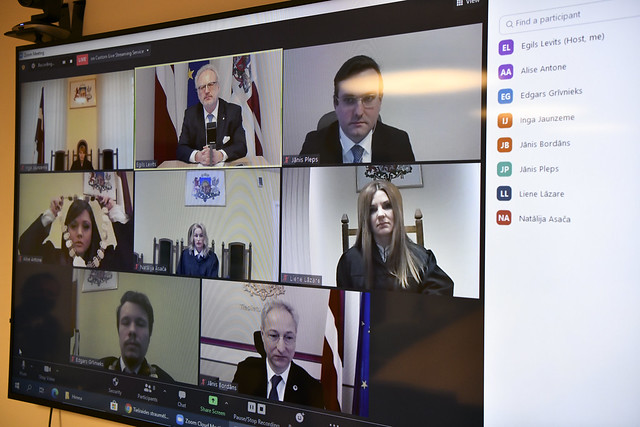Here is the full text of President Egils Levits’ speech at the ceremony:
‘Congratulations on taking the oath and joining the Latvian judicial family!
This is a unique ceremony, the first time swearing in has been conducted remotely. This only proves that our state continues to function as before. Our state is capable of delivering on its responsibilities, tasks and functions despite the state of emergency imposed due to the pandemic. Our approach to state, judicial system is far from formal, although law, of course, does not equip us with precise instructions as to how these matters should be approached. Law says nothing about ‘remote swearing in’, and until now everyone accepted that oath has to be given in person. And shortly after announcing the state of emergency, during the meeting of the heads of constitutional bodies on 23 March 2020, we adopted the fundamental principles and guidelines on joint emergency response procedures for constitutional institutions.
This is a good example of non-formalistic view of the obligations of a state. There are, of course, other examples like E-Saeima, remote meetings of the Cabinet of Ministers, remote court hearings being used more often. We can see that state is also agile, and it can adapt when necessary to deliver its core services as usual. This is a quality you as judges will also need in your everyday professional life because there is a weakness in our judicial system, which hinders it. Formalism or too formalistic approach is its name. A weakness characteristic to our public administration, and very often plaguing our judicial system too. In other words, we often follow the letter of the law, fail to see beyond the end of our nose. We fail to grasp the overarching goal of rules, laws, regulations, contracts and other legal acts. However, as trained legal experts with appropriate training we should be able to recognise these goals and intents instead of clinging to the letter of the law. I do believe you have received the appropriate training and have experienced that in practice. You are no beginners, as far as I know. From this day forward, you are on your own, solely responsible for the verdicts that you make. I have been a judge for 25 years and I know what it means to be working in solitude as a judge. You first come up with your own judgement and then discuss it with your colleagues, but you have to get the facts straight yourself first. To be able to arrive at your own judgement, you need to find the most crucial answers as to why and what for. It is not always easy; it does not come to you as soon as you have finished reading. So, I assume you will be able to develop the ability to distance yourself from formalistic interpretation and look at the matter at hand for what it really is and will hang on to this quality until the end of your career as a judge (just as we did a couple of minutes ago when you had to give your oath on your first day as judges).
You gave the traditional oath of a judge. Oath that has a deep meaning. Oath that I think you should revisit from time to time. I talked about why just a moment ago, and every word you can find in this oath has a clear answer to that. Let me mention some of them. Honesty. Integrity. Sense of justice.
Let us start with honesty. Honesty is the building block of any human relationship. What I am saying is that you have to do what is right by you. I know how difficult it is in any normal circumstance, but as judges you have certain privileges. You can do that because you are independent in your judgements. No one can tell you what you should do with your verdict, how you should approach the case at hand and how to solve it.
As for the second one, the integrity, it is a whole separate subject that we can spend hours talking about, but it is something that you will have to reflect on your own, something you will have to figure out yourself. There are a lot of factors to consider. Your verdict at the end of the day, the judgement that you give to the parties, must bring justice the way that you see it. You have to believe in it. You cannot decide something you will then question yourself. Sense of integrity is therefore very important. It is not the only criteria of justice, but it certainly is one of judge’s main assets. The sense of integrity. A lot hinges on character. When judges say they feel pressure or being pressured, it actually shows that their character is weak. Any pressure on a judge is actually impossible. If anyone attempts it, strong-willed judges will simply shrug it off and do what their sense of integrity and justice tells them to do. I have no doubt all of you have the necessary strength of character to wear the robe with pride.
Thirdly, as your oath says, you need the sense of justice. That is a part of your allegiance to the state. In our case it is Latvia, of course. You represent this state, which is an abstract phenomenon. You cannot see it; you cannot feel it like any other object. A state is a construct, a construct that lives through people, especially judges and all civil servants who represent the state they are employed by.
All these three qualities that the oath of a judge talks about are good guiding stars that you will follow in your further professional career.
You have joined the ranks of judicial system workers. Judiciary is one of the three branches of government. The other two are executive and legislative. All three branches work together and ensure that the state delivers on expectations. And this reminds me again of the urban myth about the court independence. I am talking about courts working in complete isolation from other branches of government. It is absolutely not true. On the contrary, all branches of government must work together for the common benefit of the Latvia State. That is exactly what happened on 23 March 2020 when constitutional bodies (President, Speaker, Prime Minister, President of Constitutional Court and Chief Justice of the Supreme Court) came together and laid the ground for state-level response to the emergency, defining how government will work under lockdown. And you are now a part of the government as members of the judiciary.
Judicial branch is independent. That is what sets you apart from the other branches of the government. I cannot stress enough that your independence is inward-oriented, enabling you to be free in your judgements. From now on you are also an integral part of the self-governing mechanisms of the judiciary. In autumn you will hopefully be able to come together in person at the regular general meeting of judges, which is the highest self-governing body of the judiciary, for the first time as full-fledged members of the judiciary. I think that active participation in the work of the judiciary’s self-governing body on top of your primary responsibilities is a must. You should relentlessly pursue different avenues for making your work and the performance of judiciary system better, and thus make our country better. We are looking forward to your ideas and suggestions.
Good luck everyone! Thank you!”





